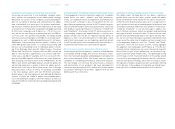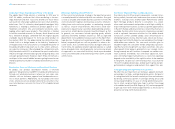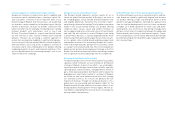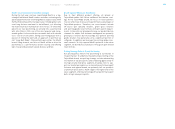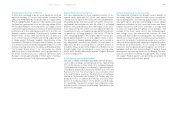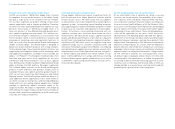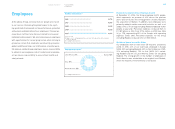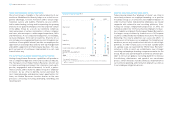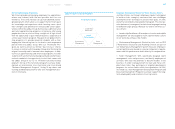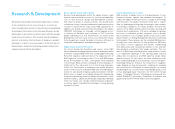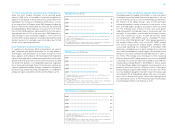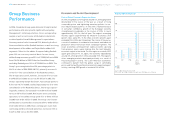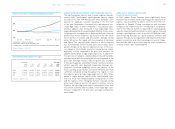Reebok 2006 Annual Report Download - page 67
Download and view the complete annual report
Please find page 67 of the 2006 Reebok annual report below. You can navigate through the pages in the report by either clicking on the pages listed below, or by using the keyword search tool below to find specific information within the annual report.063
» Global Operations
» Sustainability
Corporate Functions ›
Sustainability
The adidas Group must manage wide-ranging commercial
and competitive pressures to deliver growth. Simultane-
ously, we have a responsibility towards our employees and
the environment, to ensure decent working conditions and
environmental standards are met throughout our global
organization and supply chain. We always strive to manage
both our own activities and our supply chain responsibly
and to reduce our environmental impact. Moreover, we
believe that acting as good corporate citizens will improve
our corporate reputation and hence our economic value,
helping us to be a sustainable company.
Open Dialog and Interaction with Stakeholders
We actively and systematically engage with our numerous
stakeholders, involving them in key social and environmen-
tal decisions that shape day-to-day operations. In this way,
we can balance interests, build consensus and enhance the
transparency of our business. We pursue a policy of open dia-
log with stakeholders – debating issues and approaches and,
where appropriate, forming partnerships to develop long-
term solutions. We continue to drive and comment on industry
best practice relating to stakeholders through our member-
ship of organizations such as the World Business Council for
Sustainable Development, Business for Social Responsibil-
ity, the World Federation of the Sporting Goods Industry and
the Fair Labor Association. This provides the Group with the
opportunity to work closely with top companies from various
sectors to develop sustainable business approaches and to
debate social and environmental topics on a global level. The
adidas Group makes every effort to achieve open and trans-
parent reporting. Comprehensive information on the Group’s
social and environmental programs is provided on our web-
site under www.adidas-Group.com/sustainability.
Merging Leading Programs
Both the adidas Group and Reebok have strong track records
in transparent reporting about social and environmental
performance and supporting third-party verification of our
programs. With the acquisition of Reebok, the Group’s ambi-
tion is to combine the best of both programs in a new adidas
Group Social and Environmental Affairs (SEA) team. During
2006, we revised our social and environmental program to
incorporate new standards, guidelines and procedures, cov-
ering supplier guidance, initial factory assessments and com-
pliance monitoring. Our assessments are now recorded in an
industry-wide data management system (Fair Factory Clear-
ing House) that Reebok helped establish. This facilitates the
exchange and increased transparency of compliance-related
information within our industry. The outcome is a more robust
program that will deliver stronger results in improving social
and environmental conditions.
Setting Clear Standards
The adidas Group’s Workplace Standards are based on the
International Labour Organization (ILO) and UN conventions
relating to human rights and employment practices, and fol-
low the World Federation of the Sporting Goods Industry’s
model code of conduct. Our Workplace Standards contain
clear rules of conduct regarding environmentally sound, safe
and healthy working conditions, fair wages and benefits, free-
dom of association, prohibition of excessive overtime, forced
and child labor, and protection against harassment and dis-
crimination. The Standards help us to select business part-
ners that have workplace standards and business practices
consistent with our values and to reject those that do not. As
guiding principles they also help identify potential problems
so that we can work with our business partners to address
issues of concern as they arise.
Encouraging Self-Governance through Management Systems
Good management systems help factories improve their day-
to-day operations and support the process of internalization
and self-governance. Therefore, we support our business
partners in pursuing the opportunity for certification with
internationally recognized standards such as ISO (Interna-
tional Standardization Organization) 9000 and 14001 for qual-
ity and environmental management and OHSAS (Occupational
Health and Safety Assessment Series) 18000. By establishing
a certified management system, our suppliers demonstrate
this commitment to continuously improve their performance.
We help them build or improve human resources systems
at factories to maintain good working conditions, including
factory grievance systems to routinely find and fix non-
compliance problems. Further, we empower workers to pro-
tect their own rights and take an active role in decisions that
affect their lives. In 2006, there were 35 adidas Group foot-
wear suppliers’ factories worldwide certified in accordance
with OHSAS 18000, ISO 14001 and/or the ISO 9000 series.


